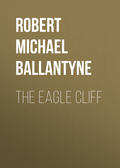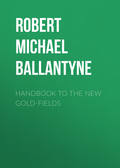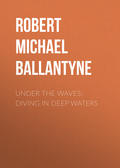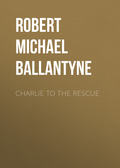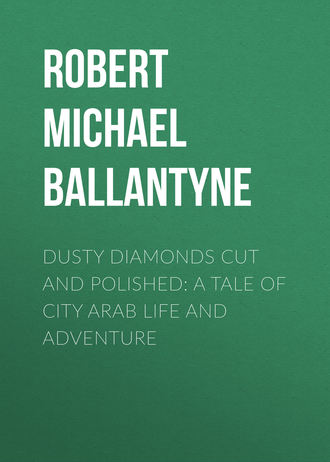
Robert Michael Ballantyne
Dusty Diamonds Cut and Polished: A Tale of City Arab Life and Adventure
Chapter Twenty Nine.
Home Again
Time passed away, and Bobby Frog said to his mother one morning, “Mother, I’m going to England.”
It was a fine summer morning when he said this. His mother was sitting in a bower which had been constructed specially for her use by her son and his friend Tim Lumpy. It stood at the foot of the garden, from which could be had a magnificent view of the neighbouring lake. Rich foliage permitted the slanting sunbeams to quiver through the bower, and little birds, of a pert conceited nature, twittered among the same. Martha Mild—the very embodiment of meek, earnest simplicity, and still a mere child in face though almost a woman in years—sat on a wooden stool at Mrs Frog’s feet reading the Bible to her.
Martha loved the Bible and Mrs Frog; they were both fond of the bower; there was a spare half-hour before them;—hence the situation, as broken in upon by Bobby.
“To England, Bobby?”
“To England, mother.”
Martha said nothing, but she gave a slight—an almost imperceptible—start, and glanced at the sturdy youth with a mingled expression of anxiety and surprise.
The surprise Bob had expected; the anxiety he had hoped for; the start he had not foreseen, but now perceived and received as a glorious fact! Oh! Bobby Frog was a deep young rascal! His wild, hilarious, reckless spirit, which he found it so difficult to curb, even with all surroundings in his favour, experienced a great joy and sensation of restfulness in gazing at the pretty, soft, meek face of the little waif. He loved Martha, but, with all his recklessness, he had not the courage to tell her so, or to ask the condition of her feelings with regard to himself.
Being ingenious, however, and with much of the knowing nature of the “stray” still about him, he hit on this plan of killing two birds with one stone, as it were, by briefly announcing his intentions to his mother; and the result was more than he had hoped for.
“Yes, mother, to England—to London. You see, father’s last letter was not at all satisfactory. Although he said he was convalescent and hoped to be able to travel soon, it seemed rather dull in tone, and now several posts have passed without bringing us a letter of any kind from him. I am beginning to feel anxious, and so as I have saved a good bit of money I mean to have a trip to old England and bring Daddy out with me.”
“That will be grand indeed, my son. But will Mr Merryboy let ye go, Bobby?”
“Of course he will. He lets me do whatever I please, for he’s as fond o’ me as if he were my father.”
“No; he ain’t that,” returned Mrs Frog, with a shake of the head; “your father was rough, Bobby, specially w’en in liquor, but he ’ad a kind ’art at bottom, and he was very fond o’ you, Bobby—almost as fond as he once was o’ me. Mr Merryboy could never come up to ’im in that.”
“Did I say he came up to him, mother? I didn’t say he was as fond o’ me as my own father, but as if he was my father. However, it’s all arranged, and I go off at once.”
“Not before breakfast, Bobby?”
“No, not quite. I never do anything important on an empty stomach, but by this time to-morrow I hope to be far on my way to the sea-coast, and I expect Martha to take good care of you till I come back.”
“I’ll be sure to do that,” said Martha, looking up in Mrs Frog’s face affectionately.
Bob Frog noted the look, and was satisfied.
“But, my boy, I shan’t be here when you come back. You know my visit is over in a week, and then we go to Sir Richard’s estate.”
“I know that, mother, but Martha goes with you there, to help you and Hetty and Matty to keep house while Tim Lumpy looks after the farm.”
“Farm, my boy, what nonsense are you talking?”
“No nonsense, mother, it has all been arranged this morning, early though it is. Mr Merryboy has received a letter from Sir Richard, saying that he wants to gather as many people as possible round him, and offering him one of his farms on good terms, so Mr Merryboy is to sell this place as soon as he can, and Tim and I have been offered a smaller farm on still easier terms close to his, and not far from the big farm that Sir Richard has given to his son-in-law Mr Welland—”
“Son-in-law!” exclaimed Mrs Frog. “Do you mean to say that Mr Welland, who used to come down an’ preach in the lodgin’-’ouses in Spitalfields ’as married that sweet hangel Miss Di?”
“I do mean that, mother. I could easily show him a superior angel, of course,” said Bob with a steady look at Martha, “but he has done pretty well, on the whole.”
“Pretty well!” echoed Mrs Frog indignantly; “he couldn’t ’ave done better if ’e’d searched the wide world over.”
“There I don’t agree with you,” returned her son; “however, it don’t matter—Hallo! there goes granny down the wrong path!”
Bob dashed off at full speed after Mrs Merryboy, senior, who had an inveterate tendency, when attempting to reach Mrs Frog’s bower, to take a wrong turn, and pursue a path which led from the garden to a pretty extensive piece of forest-land behind. The blithe old lady was posting along this track in a tremulo-tottering way when captured by Bob. At the same moment the breakfast-bell rang; Mr Merryboy’s stentorian voice was immediately heard in concert; silvery shouts from the forest-land alluded to told where Hetty and Matty had been wandering, and a rush of pattering feet announced that the dogs of the farm were bent on being first to bid the old gentleman good-morning.
As Bob Frog had said, the following day found him far on his way to the sea-coast. A few days later found him on the sea,—wishing, earnestly, that he were on the land! Little more than a week after that found him in London walking down the old familiar Strand towards the city.
As he walked slowly along the crowded thoroughfare, where every brick seemed familiar and every human being strange, he could not help saying to himself mentally, “Can it be possible! was it here that I used to wander in rags? Thank God for the rescue and for the rescuers!”
“Shine yer boots, sir?” said a facsimile of his former self.
“Certainly, my boy,” said Bob, at once submitting himself to the operator, although, his boots having already been well “shined,” the operation was an obvious absurdity.
The boy must have felt something of this, for, when finished, he looked up at his employer with a comical expression. Bob looked at him sternly.
“They were about as bright before you began on ’em,” he said.
“They was, sir,” admitted the boy, candidly.
“How much?” demanded the old street boy. “On’y one ha’penny, sir,” replied the young street boy, “but ven the day’s fine, an’ the boots don’t want much shinin’, we gin’rally expecs a penny. Gen’l’min ’ave bin known to go the length of tuppence.”
Bob pulled out half-a-crown and offered it.
The boy grinned, but did not attempt to take it.
“Why don’t you take it, my boy?”
“You don’t mean it, do you?” asked the boy, as the grin faded and the eyes opened.
“Yes, I do. Here, catch. I was once like you. Christ and Canada have made me what you see. Here is a little book that will tell you more about that.”
He chanced to have one of Miss Macpherson’s Canadian Homes for London Wanderers in his pocket, and gave it to the little shoe-black,—who was one of the fluttering free-lances of the metropolis, not one of the “Brigade.”
Bob could not have said another word to have saved his life. He turned quickly on his heel and walked away, followed by a fixed gaze and a prolonged whistle of astonishment.
“How hungry I used to be here,” he muttered as he walked along, “so uncommon hungry! The smell of roasts and pies had something to do with it, I think. Why, there’s the shop—yes, the very shop, where I stood once gazing at the victuals for a full hour before I could tear myself away. I do think that, for the sake of starving boys, to say nothing of men, women, and girls, these grub-shops should be compelled to keep the victuals out o’ the windows and send their enticing smells up their chimneys!”
Presently he came to a dead stop in front of a shop where a large mirror presented him with a full-length portrait of himself, and again he said mentally, “Can it be possible!” for, since quitting London he had never seen himself as others saw him, having been too hurried, on both occasions of passing through Canadian cities, to note the mirrors there. In the backwoods, of course, there was nothing large enough in the way of mirror to show more than his good-looking face.
The portrait now presented to him was that of a broad-chested, well-made, gentlemanly young man of middle height, in a grey Tweed suit.
“Not exactly tip-top, A1, superfine, you know, Bobby,” he muttered to himself with the memory of former days strong upon him, “but—but—perhaps not altogether unworthy of—of—a thought or two from little Martha Mild.”
Bob Frog increased in stature, it is said, by full half an inch on that occasion, and thereafter he walked more rapidly in the direction of Whitechapel.
With sad and strangely mingled memories he went to the court where his early years had been spent. It was much the same in disreputableness of aspect as when he left it. Time had been gnawing at it so long that a few years more or less made little difference on it, and its inhabitants had not improved much.
Passing rapidly on he went straight to the Beehive, which he had for long regarded as his real home, and there, once again, received a hearty welcome from its ever busy superintendent and her earnest workers; but how different his circumstances now from those attending his first reception! His chief object, however, was to inquire the way to the hospital in which his father lay, and he was glad to learn that the case of Ned Frog was well-known, and that he was convalescent.
It chanced that a tea-meeting was “on” when he arrived, so he had little more at the time than a warm shake of the hand from his friends in the Home, but he had the ineffable satisfaction of leaving behind him a sum sufficient to give a sixpence to each of the miserable beings who were that night receiving a plentiful meal for their bodies as well as food for their souls—those of them, at least, who chose to take the latter. None refused the former.
On his way to the hospital he saw a remarkably tall policeman approaching.
“Well, you are a long-legged copper,” he muttered to himself, with an irrepressible laugh as he thought of old times. The old spirit seemed to revive with the old associations, for he felt a strong temptation to make a face at the policeman, execute the old double-shuffle, stick his thumb to the end of his nose, and bolt! As the man drew nearer he did actually make a face in spite of himself—a face of surprise—which caused the man to stop.
“Excuse me,” said Bob, with much of his old bluntness, “are not you Number 666?”
“That is not my number now, sir, though I confess it was once,” answered the policeman, with a humorous twinkle of the eye.
Bobby noticed the word “sir,” and felt elated. It was almost more than waif-and-stray human nature could stand to be respectfully “sirred” by a London policeman—his old foe, whom, in days gone by and on occasions innumerable, he had scorned, scouted, and insulted, with all the ingenuity of his fertile brain.
“Your name is Giles Scott, is it not?” he asked.
“It is, sir.”
“Do you remember a little ragged boy who once had his leg broken by a runaway pony at the West-end—long ago?”
“Yes, as well as if I’d seen him yesterday. His name was Bobby Frog, and a sad scamp he was, though it is said he’s doing well in Canada.”
“He must ’ave changed considerable,” returned Bob, reverting to his old language with wonderful facility, “w’en Number 666 don’t know ’im. Yes, in me, Robert Frog, Esquire, of Chikopow Farm, Canada Vest, you be’old your ancient henemy, who is on’y too ’appy to ’ave the chance of axin your parding for all the trouble he gave you, an’ all the ’ard names he called you in days gone by.”
Bobby held out his hand as he spoke, and you may be sure our huge policeman was not slow to grasp it, and congratulate the stray on his improved circumstances.
We have not time or space to devote to the conversation which ensued. It was brief, but rapid and to the point, and in the course of it Bob learned that Molly was as well, and as bright and cheery as ever—also somewhat stouter; that Monty was in a fair way to become a real policeman, having just received encouragement to expect admission to the force when old enough, and that he was in a fair way to become as sedate, wise, zealous, and big as his father; also, that little Jo aimed at the same honourable and responsible position, and was no longer little.
Being anxious, however, to see his father, Bob cut the conversation short, and, having promised to visit his old enemy, hastened away.
The ward of the hospital in which Bob soon found himself was a sad place. Clean and fresh, no doubt, but very still, save when a weary sigh or a groan told of suffering. Among the beds, which stood in a row, each with its head against the wall, one was pointed out on which a living skeleton lay. The face was very very pale, and it seemed as if the angel of death were already brooding over it. Yet, though so changed, there was no mistaking the aspect and the once powerful frame of Ned Frog.
“I’d rather not see any one,” whispered Ned, as the nurse went forward and spoke to him in a low voice, “I’ll soon be home—I think.”
“Father, dear father,” said Bob, in a trembling, almost choking voice, as he knelt by the bedside and took one of his father’s hands.
The prostrate man sprang up as if he had received an electric shock, and gazed eagerly into the face of his son. Then, turning his gaze on the nurse, he said—
“I’m not dreaming, am I? It’s true, is it? Is this Bobby?”
“Whether he’s Bobby or not I can’t say,” replied the nurse, in the tone with which people sometimes address children, “but you’re not dreaming—it is a gentleman.”
“Ah! then I am dreaming,” replied the sick man, with inexpressible sadness, “for Bobby is no gentleman.”
“But it is me, daddy,” cried the poor youth, almost sobbing aloud as he kissed the hand he held, “why, you old curmudgeon, I thought you’d ’ave know’d the voice o’ yer own son! I’ve grow’d a bit, no doubt, but it’s me for all that. Look at me!”
Ned did look, with all the intensity of which he was capable, and then fell back on his pillow with a great sigh, while a death-like pallor overspread his face, almost inducing the belief that he was really dead.
“No, Bobby, I ain’t dead yet,” he said in a low whisper, as his terrified son bent over him. “Thank God for sendin’ you back to me.”
He stopped, but, gradually, strength returned, and he again looked earnestly at his son.
“Bobby,” he said, in stronger tones, “I thought the end was drawin’ near—or, rather, the beginnin’—the beginnin’ o’ the New Life. But I don’t feel like that now. I feel, some’ow, as I used to feel in the ring when they sponged my face arter a leveller. I did think I was done for this mornin’. The nurse thought so too, for I ’eerd her say so; an’ the doctor said as much. Indeed I’m not sure that my own ’art didn’t say so—but I’ll cheat ’em all yet, Bobby, my boy. You’ve put new life into my old carcase, an’ I’ll come up to the scratch yet—see if I don’t.”
But Ned Frog did not “come up to the scratch.” His work for the Master on earth was finished—the battle fought out and the victory gained.
“Gi’ them all my love in Canada, Bobby, an’ say to your dear mother that I know she forgives me—but I’ll tell her all about that when we meet—in the better land.”
Thus he died with his rugged head resting on the bosom of his loved and loving son.
Chapter Thirty.
The New Home
Once again, and for the last time, we shift our scene to Canada—to the real backwoods now—the Brandon Settlement.
Sir Richard, you see, had been a noted sportsman in his youth. He had chased the kangaroo in Australia, the springbok in Africa, and the tiger in India, and had fished salmon in Norway, so that his objections to the civilised parts of Canada were as strong as those of the Red Indians themselves. He therefore resolved, when making arrangements to found a colony, to push as far into the backwoods as was compatible with comfort and safety. Hence we now find him in the very far West.
We decline to indicate the exact spot, because idlers, on hearing of its fertility and beauty and the felicity of its inhabitants, might be tempted to crowd to it in rather inconvenient numbers. Let it suffice to say, in the language of the aborigines, that it lies towards the setting sun.
Around Brandon Settlement there are rolling prairies, illimitable pasture-land, ocean-like lakes, grand forests, and numerous rivers and rivulets, with flat-lands, low-lands, high-lands, undulating lands, wood-lands, and, in the far-away distance, glimpses of the back-bone of America—peaked, and blue, and snow-topped.
The population of this happy region consists largely of waifs with a considerable sprinkling of strays. There are also several families of “haristocrats,” who, however, are not “bloated”—very much the reverse.
The occupation of the people is, as might be expected, agricultural; but, as the colony is very active and thriving and growing fast, many other branches of industry have sprung up, so that the hiss of the saw and the ring of the anvil, the clatter of the water-mill, and the clack of the loom, may be heard in all parts of it.
There is a rumour that a branch of the Great Pacific Railway is to be run within a mile of the Brandon Settlement; but that is not yet certain. The rumour, however, has caused much joyful hope to some, and rather sorrowful anxiety to others. Mercantile men rejoice at the prospect. Those who are fond of sport tremble, for it is generally supposed, though on insufficient grounds, that the railway-whistle frightens away game. Any one who has travelled in the Scottish Highlands and seen grouse close to the line regarding your clanking train with supreme indifference, must doubt the evil influence of railways on game. Meanwhile, the sportsmen of Brandon Settlement pursue the buffalo and stalk the deer, and hunt the brown and the grizzly bear, and ply rod, net, gun, and rifle, to their hearts’ content.
There is even a bank in this thriving settlement—a branch, if we mistake not, of the flourishing Bank of Montreal—of which a certain Mr Welland is manager, and a certain Thomas Balls is hall-porter, as well as general superintendent, when not asleep in the hall-chair. Mrs Welland, known familiarly as Di, is regarded as the mother of the settlement—or, more correctly, the guardian angel—for she is not yet much past the prime of life. She is looked upon as a sort of goddess by many people; indeed she resembles one in mind, face, figure, and capacity. We use the last word advisedly, for she knows and sympathises with every one, and does so much for the good of the community, that the bare record of her deeds would fill a large volume. Amongst other things she trains, in the way that they should go, a family of ten children, whose adoration of her is said to be perilously near to idolatry. She also finds time to visit an immense circle of friends. There are no poor in Brandon Settlement yet, though there are a few sick and a good many aged, to whom she ministers. She also attends on Sir Richard, who is part of the Bank family, as well as a director.
The good knight wears well. His time is divided between the children of Di, the affairs of the settlement, and a neighbouring stream in which the trout are large and pleasantly active. Mrs Screwbury, who spent her mature years in nursing little Di, is renewing her youth by nursing little Di’s little ones, among whom there is, of course, another little Di whom her father styles Di-licious. Jessie Summers assists in the nursery, and the old cook reigns in the Canadian kitchen with as much grace as she formerly reigned in the kitchen at the “West-End.”
Quite close to the Bank buildings there is a charming villa, with a view of a lake in front and a peep through the woods at the mountains behind, in which dwells the cashier of the Bank with his wife and family. His name is Robert Frog, Esquire. His wife’s name is Martha. His eldest son, Bobby—a boy of about nine or ten—is said to be the most larky boy in the settlement. We know not as to that, but any one with half an eye can see that he is singularly devoted to his mild little brown-eyed mother.
There is a picturesque little hut at the foot of the garden of Beehive Villa, which is inhabited by an old woman. To this hut Bobby the second is very partial, for the old woman is exceedingly fond of Bobby—quite spoils him in fact—and often entertains him with strange stories about a certain lion of her acquaintance which was turned into a lamb. Need we say that this old woman is Mrs Frog? The Bank Cashier offered her a home in Beehive Villa, but she prefers the little hut at the foot of the garden, where she sits in state to receive visitors and is tenderly cared for by a very handsome young woman named Matty, who calls her “mother”. Matty is the superintendent of a neighbouring school, and it is said that one of the best of the masters of that school is anxious to make Matty and the school his own. If so, that master must be a greedy fellow—all things considered.
There is a civil engineer—often styled by Bob Frog an uncivil engineer—who has planned all the public works of the settlement, and is said to have a good prospect of being engaged in an important capacity on the projected railway. But of this we cannot speak authoritatively. His name is T Lampay, Esquire. Ill-natured people assert that when he first came to the colony his name was Tim Lumpy, and at times his wife Hetty calls him Lumpy to his face, but, as wives do sometimes call their husbands improper names, the fact proves nothing except the perversity of woman. There is a blind old woman in his establishment, however, who has grown amiably childish in her old age, who invariably calls him Tim. Whatever may be the truth as to this, there is no question that he is a thriving man and an office-bearer in the Congregational church, whose best Sabbath-school teacher is his wife Hetty, and whose pastor is the Reverend John Seaward—a man of singular good fortune, for, besides having such men as Robert Frog, T. Lampay, and Sir Richard Brandon to back him up and sympathise with him on all occasions, he is further supported by the aid and countenance of Samuel Twitter, senior, Samuel Twitter, junior, Mrs Twitter, and all the other Twitters, some of whom are married and have twitterers of their own.
Samuel Twitter and his sons are now farmers! Yes, reader, you may look and feel surprised to hear it, but your astonishment will never equal that of old Twitter himself at finding himself in that position. He never gets over it, and has been known, while at the tail of the plough, to stop work, clap a hand on each knee, and roar with laughter at the mere idea of his having taken to agriculture late in life! He tried to milk the cows when he first began, but, after having frightened two or three animals into fits, overturned half a dozen milk-pails, and been partially gored, he gave it up. Sammy is his right-hand man, and the hope of his declining years. True, this right-hand has got the name of being slow, but he is considered as pre-eminently sure.
Mrs Twitter has taken earnestly to the sick, since there are no poor to befriend. She is also devoted to the young—and there is no lack of them. She is likewise strong in the tea-party line, and among her most favoured guests are two ladies named respectively Loper and Larrabel, and two gentlemen named Crackaby and Stickler. It is not absolutely certain whether these four are a blessing to the new settlement or the reverse. Some hold that things in general would progress more smoothly if they were gone; others that their presence affords excellent and needful opportunity for the exercise of forbearance and charity. At all events Mrs Twitter holds that she could not live without them, and George Brisbane, Esquire, who owns a lovely mansion on the outskirts of the settlement, which he has named Lively Hall, vows that the departure of that quartette would be a distinct and irreparable loss to society in Brandon Settlement.
One more old friend we have to mention, namely, Reggie North, who has become a colporteur, and wanders far and near over the beautiful face of Canada, scattering the seed of Life with more vigour and greater success than her sons scatter the golden grain. His periodical visits to the settlement are always hailed with delight, because North has a genial way of relating his adventures and describing his travels, which renders it necessary for him to hold forth as a public lecturer at times in the little chapel, for the benefit of the entire community. On these occasions North never fails, you may be quite sure, to advance his Master’s cause.
Besides those whom we have mentioned, there are sundry persons of both sexes who go by such names as Dick Swiller, Blobby, Robin, Lilly Snow, Robbie Dell, and Little Mouse, all of whom are grown men and women, and are said to have originally been London waifs and strays. But any one looking at them in their backwoods prosperity would pooh-pooh the idea as being utterly preposterous!
However this may be, it is quite certain that they are curiously well acquainted with the slums of London and with low life in that great city. These people sometimes mention the name of Giles Scott, and always with regret that that stalwart policeman and his not less stalwart sons are unable to see their way to emigrate, but if they did, as Bobby Frog the second asks, “what would become of London?”
“They’d make such splendid backwoodsmen,” says one.
“And the daughters would make such splendid wives for backwoodsmen,” says another.
Mr Merryboy thinks that Canada can produce splendid men of its own without importing them from England, and Mrs Merryboy holds that the same may be said in regard to the women of Canada, and old granny, who is still alive, with a face like a shrivelled-up potato, blinks with undimmed eyes, and nods her snow-white head, and beams her brightest smile in thorough approval of these sentiments.
Ah, reader! Brandon Settlement is a wonderful place, but we may not linger over it now. The shadows of our tale have lengthened out, and the sun is about to set. Before it goes quite down let us remind you that the Diamonds which you have seen dug out, cut, and polished, are only a few of the precious gems that lie hidden in the dust of the great cities of our land; that the harvest might be very great, and that the labourers at the present time are comparatively few.



